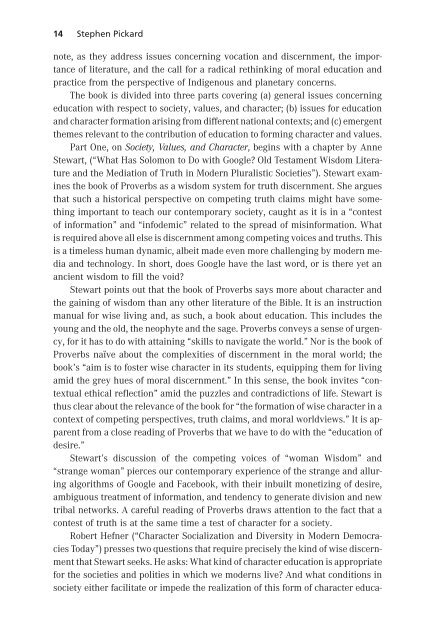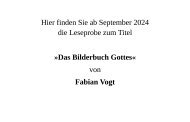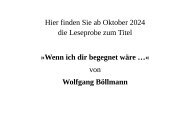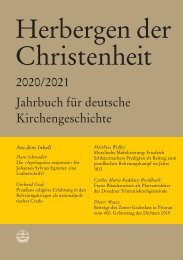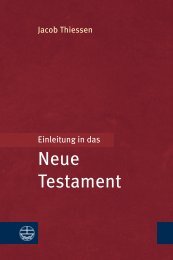Stephen Pickard | Michael Welker | John Witte (Eds.): The Impact of Education (Leseprobe)
This book investigates the impact of education on the formation of character, moral education and the communication of values in late modern pluralistic societies. Scholars from four continents and many different academic fields are involved. While the basic framework for the contributions is informed by Christian traditions, the disciplines cover a significant range, including theology, education, psychology, literature, anthropology, law, and business. This makes for a rich variety of thematic concentrations and perspectives. Readers will quickly sense that the educational foundations and trajectories of any given country are pervasive and have a significant reach into the fabric and shape of the society and its values, making education a barometer of the well-being of a people and their culture. The result is a volume that will inform, stimulate and challenge our understanding of the role of education in contemporary societies.
This book investigates the impact of education on the formation of character, moral education and the communication of values in late modern pluralistic societies. Scholars from four continents and many different academic fields are involved. While the basic framework for the contributions is informed by Christian traditions, the disciplines cover a significant range, including theology, education, psychology, literature, anthropology, law, and business. This makes for a rich variety of thematic concentrations and perspectives. Readers will quickly sense that the educational foundations and trajectories of any given country are pervasive and have a significant reach into the fabric and shape of the society and its values, making education a barometer of the well-being of a people and their culture. The result is a volume that will inform, stimulate and challenge our understanding of the role of education in contemporary societies.
You also want an ePaper? Increase the reach of your titles
YUMPU automatically turns print PDFs into web optimized ePapers that Google loves.
14 <strong>Stephen</strong> <strong>Pickard</strong><br />
note, as they address issues concerning vocation and discernment, the importance<br />
<strong>of</strong> literature, and the call for aradical rethinking <strong>of</strong> moral education and<br />
practice from the perspective <strong>of</strong> Indigenous and planetary concerns.<br />
<strong>The</strong> book is divided into three parts covering (a) general issues concerning<br />
education with respect to society, values, and character; (b) issues for education<br />
and character formation arising from different national contexts; and (c) emergent<br />
themesrelevant to the contribution <strong>of</strong> education to forming character and values.<br />
Part One, on Society, Values, and Character, begins with achapter by Anne<br />
Stewart, (“What Has Solomon to Do with Google? Old Testament Wisdom Literature<br />
and the Mediation <strong>of</strong> Truth in Modern Pluralistic Societies”). Stewart examines<br />
the book <strong>of</strong> Proverbs as awisdomsystem for truth discernment. She argues<br />
that such ahistorical perspective on competing truth claims might have something<br />
important to teach our contemporary society, caught as it is in a “contest<br />
<strong>of</strong> information” and “infodemic” related to the spread <strong>of</strong> misinformation. What<br />
is required above all else is discernment among competing voices and truths. This<br />
is atimeless human dynamic, albeit madeeven more challenging by modern media<br />
and technology. In short, does Google have the last word, or is there yet an<br />
ancient wisdom to fill the void?<br />
Stewart points out that the book <strong>of</strong> Proverbs says more about character and<br />
the gaining <strong>of</strong> wisdom than any other literature <strong>of</strong> the Bible. It is an instruction<br />
manual for wise living and, as such, abook about education. This includes the<br />
young and the old, the neophyteand the sage. Proverbs conveys asense <strong>of</strong> urgency,<br />
for it has to do with attaining “skills to navigate the world.” Nor is the book <strong>of</strong><br />
Proverbs naïve about the complexities <strong>of</strong> discernment in the moral world; the<br />
book’s “aim is to foster wise character in its students, equipping them for living<br />
amid the grey hues <strong>of</strong> moral discernment.” In this sense, the book invites “contextual<br />
ethical reflection” amid the puzzles and contradictions <strong>of</strong> life. Stewart is<br />
thus clear about the relevance <strong>of</strong> the book for “the formation <strong>of</strong> wise character in a<br />
context <strong>of</strong> competing perspectives, truth claims, and moral worldviews.” It is apparent<br />
from aclose reading <strong>of</strong> Proverbs that we have to do with the “education <strong>of</strong><br />
desire.”<br />
Stewart’s discussion <strong>of</strong> the competing voices <strong>of</strong> “woman Wisdom” and<br />
“strange woman” pierces our contemporary experience <strong>of</strong> the strange and alluring<br />
algorithms <strong>of</strong> Google and Facebook, with their inbuilt monetizing <strong>of</strong>desire,<br />
ambiguous treatment <strong>of</strong> information, and tendency to generate division and new<br />
tribal networks. Acareful reading <strong>of</strong> Proverbs draws attention to the fact that a<br />
contest <strong>of</strong> truth is at the same time atest <strong>of</strong> character for asociety.<br />
Robert Hefner (“Character Socialization and Diversity in Modern Democracies<br />
Today”)presses two questionsthat require precisely the kind <strong>of</strong> wise discernment<br />
that Stewart seeks. He asks: What kind <strong>of</strong> character education is appropriate<br />
for the societies and polities in which we moderns live? And what conditions in<br />
society either facilitate or impede the realization <strong>of</strong> this form <strong>of</strong> character educa-


